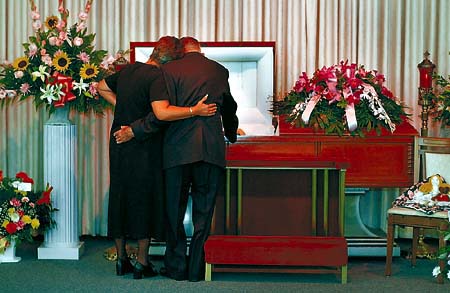












 




|
The
Rapture of the Church
The Blessed Hope
by
WordExplain
 |
"In
My
Father's house are many dwelling places ... I go to prepare a place for
you."
--
Jesus, John
14:2 |
-
Like a Jewish man speaking to his intended, Jesus
told His
followers, who would become the leaders of the Church,
"In My Father's
house are many dwelling places (John 14:2)."
A Jewish father had a
large house with many rooms in it. Customarily, a son who was planning
to marry would prepare rooms inside his father's house for himself and
his new bride. When preparations were complete and the year's
probationary period was finished, the bridegroom would come get his
bride and take her off to the wedding ceremony. After the
ceremony and the wedding feast, they would make their home in the rooms
of his father's house that he had been preparing. When Jesus
told
his followers that there were many rooms in His Father's house, He was
informing His followers that there would be adequate room for each of
them (and the untold millions who would yet become part of His bride,
the Church).
-
When Jesus said, "I go to prepare a place for you (John
14:2),"
He
was telling His followers that He would be leaving, and returning to
heaven to prepare places for them to live forever in fellowship with
Him in His presence. My understanding is that the dwelling
places Jesus is preparing for us Christians are in New
Jerusalem (Rev.
21:1-22:5). This is a city of gargantuan proportions,
measuring 1400 miles long by 1400 miles wide by 1400 miles high (Rev.
21:16). Plenty of room indeed for Jesus' bride!
-
Jesus said, "If I go and prepare a place for you, I
will
come again and receive you to Myself, that where I am, there
you may be also" (John
14:3). He was announcing that, after He had
finished
making preparations for them in heaven, He would return to meet His
bride and take her back to heaven to the homes He had built for them.
His point is that He wants eternal fellowship with us, His
followers. He wants to be in our presence, and we in His,
forever.
-
When Thomas was uncertain of the place to which Jesus was going,
Jesus
said
to him, "I am the way, and the truth, and the life; no one comes to the
Father but through Me" (John
14:6). In other words, Jesus is the only
mediator between man and God (1
Timothy 2:5). Whoever wants to go to
heaven,
whoever wants to spend an eternity with God, can do
so only through
Jesus of Nazareth, the God / Man. None of us is good enough
to
approach God on his own merits. We need to trust in Jesus to
spend eternity with Him and His Father (John
3:16).
"But
we do not want you to be uninformed, brethren, about those who are
asleep, so that you will not grieve as do the rest who have no hope."
1
Thess. 4:13
|
 https://www.wordexplain.com/glossaryj.html#James https://www.wordexplain.com/glossaryj.html#James
|
1
Thessalonians 4:13-18
-
The Christians in the Greek city of Thessalonica had
been
taught
by the Apostle Paul that Jesus could come back at any time to take them
back to heaven to be with Him. So convinced of this teaching
were
they that they began to grieve for their fellow believers in Jesus who
had passed away. They were convinced that their now dead
friends
would miss this glorious reunion with Jesus. They would not
be
able to be part of the Bride of Christ.
-
Paul writes to relieve them of their ignorance about
the
future.
He wanted to restore their hope (1 Thess. 4:13).
"But we do
not want
you to be uninformed, brethren, about those who are asleep, so that you
will not grieve as do the rest who have no hope." The
Christian
grieves at the loss of a fellow believer in death, but because he has
incredible hope, as revealed in the rest of this passage, he doesn't
grieve the same way that an unbeliever, who has no certainty beyond the
grave, does.
-
Paul continued, "For if we believe that Jesus died
and
rose
again, even so God will bring with Him those who have fallen asleep in
Jesus" (1 Thess. 4:14).
The cornerstone of our Christian faith is that
Jesus did indeed die and rise again from the dead, just as the Old
Testament predicted (1
Cor. 15:1-3). After He was
resurrected, He
appeared alive to Peter, to James, to the Twelve Disciples, and, on one
occasion, to more than five hundred believers at one time, and later,
to Paul
himself (1
Cor. 15:5-8). What Paul is saying is that one day,
Jesus will return back to earth with the spirits of those believers who
have departed from this life. In the meantime, what kind of
existence do those heavenly spirits have?
-
I like to explain that when Christians die, their
bodies
are
placed in the earth, but their spirits continue to live.
Believers' spirits are immediately ushered into the presence
of
Jesus. For the believer, to be "absent from the body" is to
be
"at home with the Lord" (2
Cor. 5:8). What do believers look
like
in heaven? They are
not ghosts. Apparently they
are given spiritual (not physical, flesh-and-blood) bodies (2
Cor.
5:1). When the Apostle John was transported to
heaven, he was
able to see "the souls of those who had been slain because of the word
of God" (Rev.
6:9). They cried out, asking how long it would
take
for their blood to be avenged on the earth. They were told to
wait awhile longer until the full number of martyrs would be completed.
Interestingly, each was given a white robe to wear (Rev.
6:10-12). I conclude then, that believers in heaven
have some
kind of spiritual body on which it is possible to hang a robe.
(You can't throw a robe around a ghost!) Later on,
John
would see "a great multitude which no one could
count, from
every nation and all tribes and peoples and tongues, standing before
the throne and before the Lamb, clothed in white robes, and palm
branches were in their hands; and they cry out with a loud
voice,
saying, 'Salvation to our God who sits on the throne, and to the Lamb'
" (Rev
7:9-10). Again, these people in heaven have bodies,
they
are wearing white robes, they have hands, with which they can hold palm
branches, they have larynxes, mouths, tongues, and teeth, with which
they can cry out loudly.
-
So these people with spiritual bodies who are part
of the
Church, who have died "in Jesus" (1
Thess. 4:14), will return with Him.
When Jesus returns, they will enjoy priority over the living
believers, according to what Jesus had personally revealed to Paul:
"For this we say to you by the word of the Lord, that we who
are
alive and remain until the coming of the Lord, will not precede those
who have fallen asleep" (1
Thess. 4:15).
-
Here is the sequence of events. First,
"For the Lord Himself will descend from heaven" (1
Thess. 4:16).
His descent will be accompanied by (a) "a shout," presumably
His
own, (b) "the voice of the archangel" (unidentified by name here, but
the only archangel identified is Michael, in Jude
1:9), and (c) "the
trumpet of God." This is the same trumpet referred to in 1
Cor.
15:52. Second,
"the dead
in Christ will rise first." This means that the Christians
who
return with Jesus from heaven in their spirit bodies will be reunited
with their resurrected earthly bodies. As Paul points out in 1
Cor. 15:51-54, these resurrection bodies are bodies of a new
order,
immortal, imperishable. Third,
"Then we who are alive and remain will be caught up together with them
in the clouds ..." (1
Thess. 4:17). The word "caught up" is
the
Greek word harpádzō (726)
which
here means to be seized or taken away. This word is used in a
number of illustrative instances in the New Testament. In Acts
8:39, after Philip had baptized the Ethiopian eunuch, the
Holy Spirit snatched
away
Philip, and the eunuch saw him no longer. In 2
Cor. 12:2, 4
Paul refers to a man (probably himself) who was caught up into the
third heaven, Paradise. In Rev.
12:5, John sees a woman
(Israel) who gave birth to a son (Jesus) who was caught up to God and His
throne, a reference to Christ's ascension. The Latin word is rapturo,
from which we derive the English word, Rapture. So this is
what
the term "Rapture" means. It means Jesus' sudden snatching
away
from the earth to Himself the resurrected and living believers of the
Church Age. Fourth,
this snatching away is done so that they might "meet the Lord in the
air, and so we shall always be with the Lord."
-
What a fantastic and glorious experience that will
be!
I
can hardly wait until it happens! Whether dead or alive,
because
I have trusted in Jesus, I shall participate in that spectacular,
life-changing event. And so may you, if you
believe in Him!
What a joyful reunion it will be to see friends and loved ones who are
believers in Christ on that great day! But the most wonderful
feature will be meeting the Lord in the air and being with Him always!
It is no wonder that Paul told these Thessalonian Christians
(and
us today), "Therefore comfort one another with these words" (1
Thess. 4:18).

1
Corinthians 15:50-58
-
In writing to the believers in the bustling Greek
seaport
city
of Corinth, Paul adds some details about the Rapture of the Church.
First he underscores that it is impossible for mere flesh and
blood to exist in the spiritual kingdom of God. So he says,
"Now
I say this, brethren, that flesh and blood cannot inherit the kingdom
of God; nor does the perishable inherit the imperishable" (1
Cor.
15:50). The bodies we have are decaying, aging
bodies,
diseased
by the ravages of sin. They are mortal, unable to inhabit the
pristine purity of eternity.
-
And so Paul reveals a mystery, meaning truth unknown
in
the Old
Testament. "Behold, I tell you a mystery; we will not all
sleep,
but we will all be changed" (1
Cor. 15:51). He is repeating
what
he had earlier told the Thessalonians: not all Christians
will
die before Christ comes, but all Christians will be changed at the
moment He comes. Both the living Christians and the
Christians
having died will have their bodies changed from mortal to immortal
bodies, from decaying bodies to glorious resurrection bodies!
-
How fast will this event happen and when will it
occur?
"...in a moment, in the twinkling of an eye, at the last
trumpet;
for the trumpet will sound, and the dead will be raised imperishable,
and we will be changed" (1
Cor. 15:52). This is no gradual
metamorphosis. It will take place as quickly as the blinking
of
an eyelid. It will happen when the last trumpet sounds, the
same
trumpet as the one described in 1
Thess. 4:16. Some confuse
this
trumpet with the seven trumpets in the Apocalypse (Rev. 8:1-9:21; 11:15).
But those are trumpets of judgment and this
is a
trumpet
of blessing. "The trumpet, as in the Old Testament, signaled
the
appearance of God (cf. Ex.
19:16). It is the last blast for the church
because this appearance shall never end (cf. 1
Cor. 13:12)" (David K.
Lowery, 1 Corinthians, The
Bible Knowledge Commentary).
Observe that each time this event, the Rapture, is described,
it
is presented as an imminent event. It could happen any time.
There are no intervening events that must occur before the
Rapture comes to pass. By contrast, note all of the events
that
must occur before the Second Coming of Christ as described elsewhere
(Matthew
24:1-31; Revelation
6:1-19:21).
-
As Paul goes on to point out, "For this perishable
[earthly body]
must put on the imperishable [resurrection body], and
this mortal
[that which is able to die] must put on immortality [that which is
unable to die]" (1
Cor. 15:53).
When that happens, the Old Testament Scripture will have been
fulfilled. Death will have been swallowed up (Isa.
25:8) and
will
have lost its sting (Hos.
13:14; 1 Cor. 15:54-56).
-
The only way victory over death can be secured is
through
Jesus
Christ (1
Cor. 15:57). Since in Him we have the firm
assurance of
immortality, let us be "always abounding in the work of the
Lord, knowing that your toil is not in vain in the Lord" (1
Cor.
15:58). Only those of us who have immortality
through Jesus
can
accomplish things that will last for eternity.
- In this beginning
portion of his first letter to the
Thessalonians, Paul commends these Christians on their model
deportment. First,
they turned to God from idols. Second,
they
endeavored to serve God. Third,
they made it their practice to wait patiently for God's Son from
heaven. We should all so live! This waiting for
God's Son amounts to waiting for the Rapture, which Paul would soon
discuss (1 Thess. 4:13-18),
seeking to allay their fears about believing loved
ones who had died before Christ returned.
-
Notice that when Jesus returns, He "rescues us from
the
wrath to come." On the one hand, it is true that Jesus'
coming rescues us from eternal judgment. But that is almost a
tautology. The characteristic of someone who is in Christ is
that he is not subject to judgment or condemnation. (See John
3:16-18; 3:36; 5:24; Romans 5:8-10; 8:1; 33-34.)
-
The more likely
meaning is that Jesus' coming
delivers
believers from the coming wrath of the Tribulation
Period.
The Tribulation is the period of time when the present dispensation
of Grace has ended. Right now God is patient
toward the human race, "not wishing for any to perish but for all to
come to repentance" (2
Pet. 3:9). But the Tribulation period
begins "the Day of the Lord," described in catastrophic terms in 2
Pet.
3:10-12. It is the time when God will unleash the
great fury
of His wrath against a rebellious and unbelieving world. John
the Apostle identifies this coming period of God's wrath in the book of
Revelation: (Rev.
6:16, 17; 11:18; 14:10; 16:19; 19:15.)
Praise God, we believers will be delivered from that terrible
time of wrath that is coming upon the world (1
Thess.
5:2-5).
The
Rapture of the Church
Prepared by James T. Bartsch
September,
2007
Published Online by WordExplain
Email Contact: jbartsch@wordexplain.com
This study is based on, and the
links reference the NEW
AMERICAN STANDARD BIBLE®,
Copyright ©
1960, 1962, 1963, 1968, 1971, 1972, 1973, 1975, 1977, 1995 by the
Lockman Foundation.
(Scripture
quotations taken from the NASB 1995.
Used by Permission.)
Search
WordExplain.com here
Updated January 26, 2023
|




















